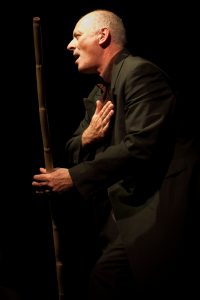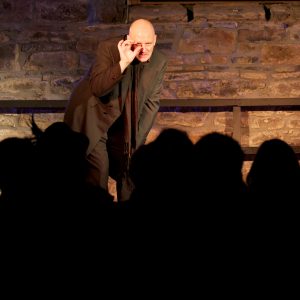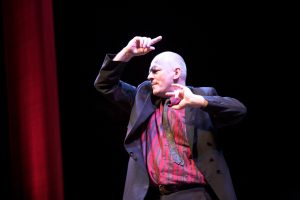As a founder of the Crick Crack Club, Ben Haggarty has been a pioneer of storytelling as a contemporary art form. This month the Crick Crack Club will be heading south of the river for the very first time to Omnibus Theatre, performing The Fate We Bring Ourselves: three raunchy, remixed Greek myths. Make sure to catch them Tue 29 May, 7.30pm, tickets HERE.
Ahead of the show we caught up with Ben Haggarty to shoot the breeze, chatting about everything from primitive man to the future of the art form.
OMNIBUS THEATRE: For anyone who may not know, what’s the difference between storytelling and theatre?
BEN HAGGARTY: What they have in common is that there’s a performance, but at that point things become very different. Storytelling, generally, is one performer on their own doing everything. There’s no writer, there’s no director, there’s no costumes, there’s no set, there’s nothing really. It’s very primal, it’s the very first shared narrative experience human beings ever had. Primarily in theatre the events happen as a spectacle, watched by spectators on the stage. In storytelling everything happens inside the audiences mind, they get an ownership over it. It’s about the imagination. Storytelling, like literature, is one of the verbal arts. The work is being done by the words, but unlike reading a book or listening to a radio, the community of listeners are there and the whole thing is improvised. It’s very dynamic. We’re not making the whole thing up as we go along but the language, the communicative energy, the movement, they’re found in the moment.
 “There’s a perfect marriage of opportunity for self-expression in something that belongs to everybody. Once you learn how to do it it’s a wonderful art form really.”
“There’s a perfect marriage of opportunity for self-expression in something that belongs to everybody. Once you learn how to do it it’s a wonderful art form really.”
OT: How do you select which stories you want to tell?
BH: Primarily I find stories that I like, you can really only tell stories that you like. I only tell traditional narrative; folk tales, fairy tales, epics and myths. I’ve been working with this art form for a very long time and I know how I can say everything that I want to say in retelling someone else’s story. There’s a perfect marriage of opportunity for self-expression in something that belongs to everybody. Once you learn how to do it it’s a wonderful art form really.
OT: Why do you think that contemporary audiences continue to engage with traditional stories like fairytales and myths and epics?
BH: Partly because they were never intended for children, most were intended for adults. We’ve had this paradoxical period of time when they’ve been kept in books and pushed to the nursery, therefore censored and simplified. That whole genre is seen as being something that is not for the contemporary adult but in fact they deal very compactly, succinctly and efficiently with every contemporary issue, from gender politics to generational tensions to race relations. The fact that they happen in a world which doesn’t involve office blocks and motor cars and computers doesn’t matter as the human inter-relationship, the emotions, the way people respond to love and loss, jealously and anger, are perennial. The Crick Crack Club have worked very hard in the last 18 years to really try and lower the age limit of people coming to our events. For a while it used to be a rather older demographic we were getting and now we’re getting the pre-family demographic. In the last 5 years, I don’t know quite why, we’ve also been attracting many more men than previously. Maybe it is something that’s changed in society. It is clear that women have always supported storytelling, and the increased presence of men is a good thing.
OT: Absolutely, that’s really interesting.
BH: It is really interesting. I also think that another aspect of why it’s working at the minute is simply because storytelling is the antithesis of engaging with a computer. It is a celebration of low tech.
OT: Like a detox.
BH: It is a detox, yes. The ownership of it. When it really works, audiences are responding imaginatively to the same story but each person has their own imagery of it. Like when you read a book, the film is never as good as the book because you compose your own world in response to what the author or the storyteller has given you.
 “Storytelling is the antithesis of engaging with a computer. It is a celebration of low tech.”
“Storytelling is the antithesis of engaging with a computer. It is a celebration of low tech.”
OT: Yeah, I suppose with cinema there are limitations to what you can show on film but there are no limitations to what you can create in your mind.
BH: Yes, and all this incredible exclusion. I remember going to see The Lord of the Rings films and sat there with my arms folded feeling, “well this is fantastic but there’s no space in this for me”. It’s completely controlled and designed for me. Every detail has been micro realised by concept artists, which is all fantastic, but I can’t get in there. It rendered me utterly passive and I’m not moved, whereas in the books I was utterly taken by them. That’s again one of the differences between the listener and the watcher. It’s how intensely do you want to let the story into you.
OT: I know the Crick Crack Club have performed in some unusual locations such as castles, rose gardens, warehouses and museums. Does the space you’re in affect the story being told?
BH: Yes, very much. That can be a positive thing and a not-so-positive thing. Primarily as storytelling started as a communal activity around a fire, fire gives you warmth, protection, it frightens off the predatory animals. There’s a certain focus of sound and a visual focus, a barely lit figure in front of a fire. What storytelling needs is the possibility of silence and the possibility of relative comfort for the audience. Not necessarily a visual focus, because some of the best things I’ve done have been in the complete utter darkness, but focus definitely. Some spaces one goes to none of that is there, like in a market, so you have to fight for it and that’s where you start to use music and your performing style becomes bigger. It’s very exciting to tell stories on historic sites, you’re evoking the stories that the people who lived in those places when they were fully functioning might have heard. It’s not just the story in the space, but the stories that those people were telling themselves and sharing in that space. That can be very, very effective.
OT: Would Omnibus Theatre, a former library, have a similar effect?
BH: I think that libraries, being places that were there to celebrate humankind’s cultural and intellectual achievements, are already imbued with an optimistic and serious approach to nourishment. We wanted to create a storytelling centre in London and we had our eyes on various libraries.
 “I think they will be rather startled and shocked, in a constructive way.”
“I think they will be rather startled and shocked, in a constructive way.”
OT: A storytelling centre would be amazing!
BH: It would be an amazing thing but we’re fighting against an arts council that’s not very enlightened. We’ve always been ahead of the curve, but they see it as an old-fashioned thing. Turn on the radio almost every programme somebody uses the word storytelling. It’s not not connected to the fact we’ve been badgering away at this for nearly 40 years.
OT: How would hope, or predict, that storytelling grows in the future within the wider arts landscape?
BH: We [the Crick Crack Club] know that with a committed marketing programme that we can sell-out our events. I would like arts centres to be much more ambitious and to programme runs of stories in the way they put on runs of a play. A two-hour solo show is a lot of work, I do The Epic of Gilgamesh and I have colleagues who tell the Illiad or the Odyssey, lengthy pieces. It would just be great to be able to do that night after night, rather than pick it up then have to put it down for 3 or 4 weeks. Each time we’re having to start again, which is good because it keeps us in a constant state of recreation, but I would like to experience what a long run is like. We’re lacking in this experience of repeated performance, which brings something I think. It requires a commitment from the venues, bold venues.
OT: Totally, the luxury to be able to inhabit the story for longer.
BH: For longer yes, and to actually really get to know one stage, one acoustic. Each space has a very different sound, the sound of your voice in each space comes back at you more or less, sharper or flatter, and that’s quite interesting. Swimming in the sound that you’re making, it would be nice to explore that over several days. You may start to realise, “oh that’s quite good, I can tell a story from the back of the stage” and all sorts. For me, and maybe it’s a reflection on my age, I would like to not have to travel so much. At the moment it’s just the gigging life, the life that all the comedians enjoy.
OT: What can Omnibus Theatre audiences expect to experience at The Fate We Bring Ourselves?
BH: I think they will enjoy themselves, I hope they will enjoy themselves. I think they will be rather startled and shocked, in a constructive way, and I hope they will come out asking questions about how to be in the world.
OT: Oh, very enigmatic.
BH: Ha, yes. Asking question about how to be in the world, how to be with your neighbour in the world.
Ben Haggarty will appear in Crick Crack Club’s The Fate We Bring Ourselves at Omnibus Theatre on May 29 – grab your tickets HERE



